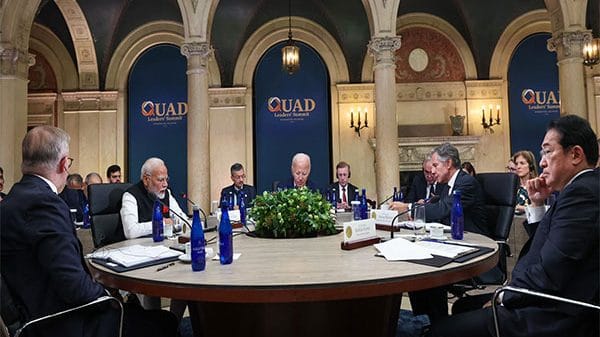It’s that time of the year. Diplomats, policymakers and experts from around the world are making a beeline for 405 East, 42nd Street in Midtown Manhattan’s Turtle Bay—headquarters of the United Nations—to muster consensus on issues that affect the lives and livelihoods of billions.
The theme for the 79th session of the UN General Assembly currently underway in New York is “leaving no one behind”. But this is no ordinary session. It’s the one right before a down-to-the-wire presidential election in the US, and also the first since Indian voters elected a coalition government led by Prime Minister Narendra Modi for a third consecutive term.
Earlier this week, the Indian Prime Minister was on a three-day visit to the US during which he took part in a meeting of Quad leaders and addressed the ‘Summit of the Future’ at the UN. During his speech at the summit he broached an idea that has long been subdued by India’s adversaries.
In his speech, Prime Minister Modi referred to himself as the democratically elected voice of “one sixth of humanity”. His message, for those looking to read between the lines, was loud and clear.
Addressing the same summit on 23 September, US Secretary of State Antony Blinken spoke in some detail about the need for reforms in international institutions that India has been advocating for long. He reiterated Washington’s firm endorsement for permanent UN Security Council seats for India, Japan and Germany, adding that the “United States supports starting negotiations on council reforms immediately”.
The fact that India, which has been in the running for a permanent UNSC seat since 1992 is still lobbying for it, underlines the stark reality that despite its significant contributions to social innovation and development, India’s representation in global social impact fora remains disproportionately modest, compared to strategic allies like the US. Even though India spent USD 280 billion on the social sector in FY23, its voice on international platforms still needs amplification.
One obvious example is the World Economic Forum where the US sends more than 200 delegates as against India’s 50-60 on average. It’s why now is the time for India to double down on strengthening its soft power.
India’s skilled diplomats have their work cut out, but to lay claim to a seat at the global high table requires more than just diplomacy. It demands a concerted effort from civil society, the diaspora, and leaders across various sectors to ensure that India’s voice is heard. Empowering changemakers, fostering innovation, and strengthening India’s leadership in emerging sectors are essential.
UNSC expansion to include more permanent and non-permanent members was proposed in 1992 by then-Secretary-General Boutros Boutros-Ghali. India has since been a part of multiple groupings to jointly campaign for these reforms. Prominent among them was the G4 (India, Brazil, Germany and Japan) and L.69 (a coalition of 42 developing countries).
How India has channelised its bilateral goodwill to work towards achieving this goal over the past decade was evident in a statement India’s External Affairs Minister S. Jaishankar made in April this year when he stated in no uncertain terms that expansion of the UNSC is “inevitable”.
To his credit, Jaishankar has masterfully improved India’s prospects by brandishing its credentials as a voice of reason on issues of international importance, from the war in Ukraine to the one in Gaza. It also puts into context India’s approach to foreign policy with “multilateralism” at its core.
Since Modi first came to power, India has also showcased its ability to lead from the front and build consensus. The decision by BRICS to set up a New Development Bank (NDB) in 2015 is a case in point; another is taking charge of the International Solar Alliance or Global Biofuels Alliance.
India is headed in the right direction and now is the time to put the pedal to the metal. A permanent seat at the UNSC, even if it comes with the same rights and privileges accorded to the P5 (France, China, Russia, the UK, and the US), including the coveted veto, will be just the beginning.
India is the land of limitless possibilities and empowering Indian changemakers could hold the key to bringing about transformative impact not just in the subcontinent but in developing countries around the world.
India’s growing global presence needs to be reflected in multilateral forums, where its contributions can shape global policy.
India’s moment has arrived. The world needs to hear more of what it has to say.
Asha Jadeja is a Silicon Valley-based entrepreneur, venture capitalist, philanthropist and a ‘change agent’. She tweets @ashajadeja325. Views are personal.
The article is sponsored by the Motwani Jadeja Foundation.






